Writing is a broad and varied industry that reaches pretty much every aspect of our daily lives. Social media posts are written, advertising is written, blog posts are written, books are written; even the TV shows and movies we watch are written.
Movies and TV shows, whether they're produced for NBC, Netflix, or the Big Screen, are all produced by teams of writers working together. These writer rooms are collaborative efforts to produce compelling media, whether it's drama, comedy, horror, or another genre entirely.
Big-budget productions often list 1-3 primary writers, but there are often entire groups of writers working for them, often working uncredited, similar to ghostwriting. Sometimes they're tasked with punching up jokes or adding drama to scenes, sometimes they smooth out scripts (as "script doctors"), and sometimes they do the bulk of the work under the guidance of a more famous writer.
Being a screenwriter is often a less-than-glamorous position in media production. They don't get top billing most of the time, and the limelight shines on a headliner and director more than the writing team. Still, screenwriters can be exceedingly important.
In fact, as part of a collective effort to protect and compensate screenwriters, the Screen Writers Guild was formed all the way back in 1921, which has since morphed into the Writer's Guild of America West.
 If you're interested in taking up screenwriting as a career, be aware that you have a long road ahead of you. It's not an easy journey to go from low-budget writer's rooms to big-name positions, but if you manage it, you can find yourself in a lifelong career.
If you're interested in taking up screenwriting as a career, be aware that you have a long road ahead of you. It's not an easy journey to go from low-budget writer's rooms to big-name positions, but if you manage it, you can find yourself in a lifelong career.Screenwriters can work in two different ways, in general.
Studio roles pay a salary, and it's sort of a "low pay but consistent payments" kind of option. The baseline is potentially higher, the peak is usually lower, and the average is decent enough for many writers trying to break into the industry.

In contrast, spec script writing is highly variable. You might make a ton of money (some of the highest-valued scripts sold for multiple millions of dollars), but you have to actually sell the script. We've all heard the cliché story of a writer moving to Hollywood, producing their script while they work as a waiter, and never making it, right? Well, that's a very real option.
One nice thing for spec scripts is that the Writers Guild of America puts minimums on the value of a script. In the absolute worst case, you still make that minimum when you sell a script. It depends, however, on what kind of script it is, and the minimums are relatively low.
In the past few decades, there have been two major writer's strikes in Hollywood. One was in 1988, and one was in 2007.
When writers go on strike, studios carry on through inertia for a while, producing what they already have the rights to produce, but they quickly run out of material. This is the pressure the Writers Guilds leverage to increase contract compensation, and it works, eventually.

A side effect of these strikes is that there's a drought of new material. When the strike ends, studios need scripts ASAP, and they enter into a seller's market. The writers, temporarily, hold all the power and set prices however high they feel they can. The majority of the record-selling scripts in that link above? They all sold during the post-strike droughts.
Realistically, unless there's another writer's strike, selling scripts for spec isn't going to net seven figures of income. More often, it's a mid five figures or low six. Of course, a lot of it also depends on the quality of the script, the amount of money the studio has to burn, and the connections you as a writer have made in the industry.
It's not easy, is what we're saying.
This one is a bit tricky.
 Screenwriting can take any form. Some studios hire writers as employees with benefits. Others hire them as contractors, and while they pay them decently, they are left to their own devices for benefits. Spec writing, meanwhile, is more common as a freelance career.
Screenwriting can take any form. Some studios hire writers as employees with benefits. Others hire them as contractors, and while they pay them decently, they are left to their own devices for benefits. Spec writing, meanwhile, is more common as a freelance career.
So, while a lot of writers who produce screenplays are freelancers, much of the data available is for those hired as employees. Studios paying writers as employees is beneficial for those who can get the job, but at the same time, it's not exactly a stable career. Studios shutter shows and entire staff groups at the drop of a hat.
Right now, for instance, HBO has been dialing back the production of most of their original content, and hundreds of writers are left without a job.
It's difficult to say what screenwriters are actually paid because it can vary so much. Here's a bunch of data from a bunch of different places to get an idea of what reported averages are.
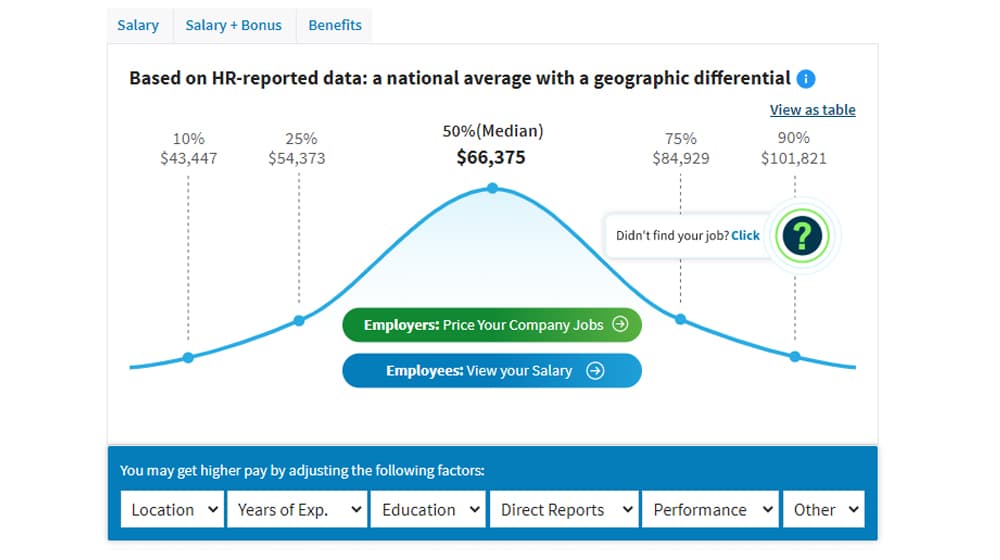
Salary.com reports that screenwriters – or, more specifically, scriptwriters – make anywhere between $43,447 on the low end and $101,821 on the high end. The median salary for this role is about $66,375. There are also typically benefits and incentives added along with these salaried positions, though what they are will depend heavily on the studio.
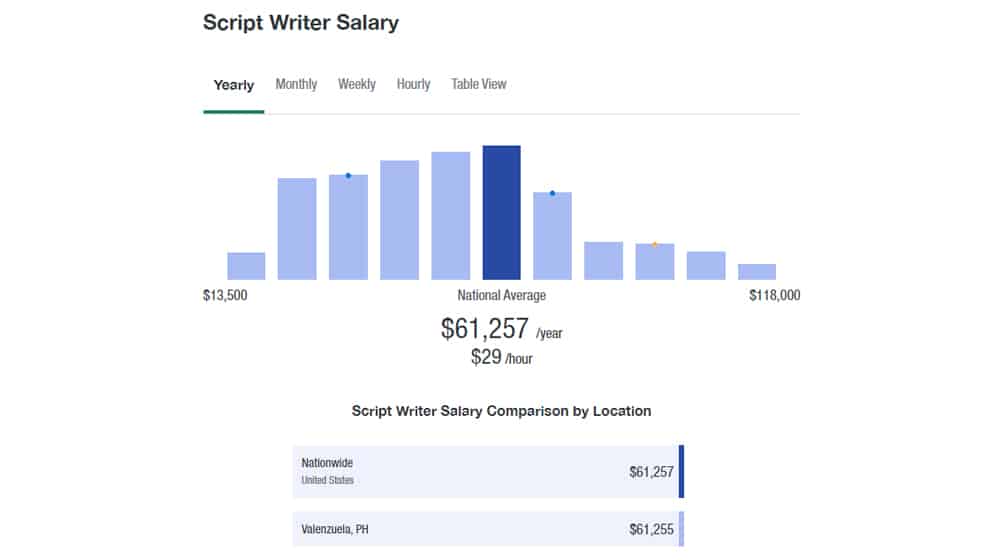
Zip Recruiter has similar numbers. Their low end for a script writer is $13,500, while their high end is $118,000. The median for their data is $61,257, or about $29 per hour. While not bad, when you consider these writers are often living in locations like Hollywood with a high cost of living, it's not exactly a living wage for most. Of course, with the growing prevalence of remote work, digital writer's rooms are becoming increasingly common, though with the drawback of a lack of networking opportunities.
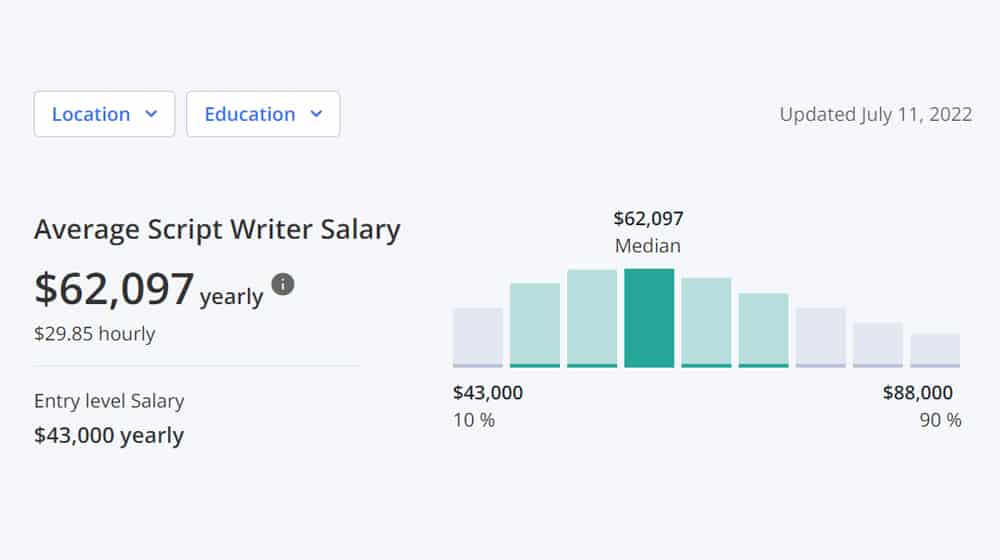
Zippia has a narrow range. Their low end is relatively high, at $43k. Their high end, though, is quite low, at $88k. This puts a median around $62k.
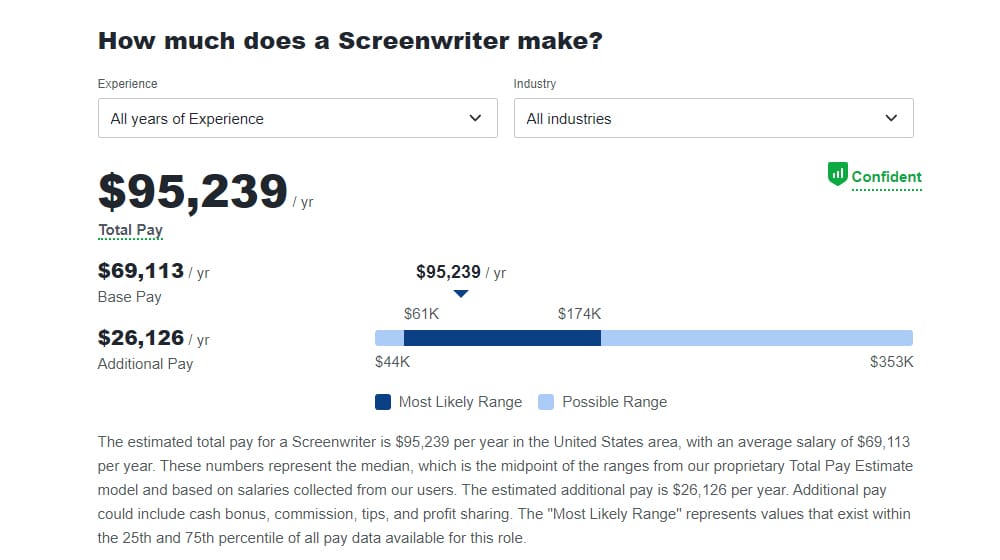
Glassdoor has a little more optimistic data. Their low end is $44k, and their high end is $353k, with a median income of around $95k. This is through data reported by employees of a wide variety of businesses, from Warner Brothers to Starbucks to self-employed screenwriters.
Remember, as well, that big Hollywood studios aren't the only form of screenwriting out there. Smaller studios need screenwriters, and even digital media needs scripts produced for the content they create. YouTube screenwriters can earn a respectable salary as well, depending on the production house paying them.
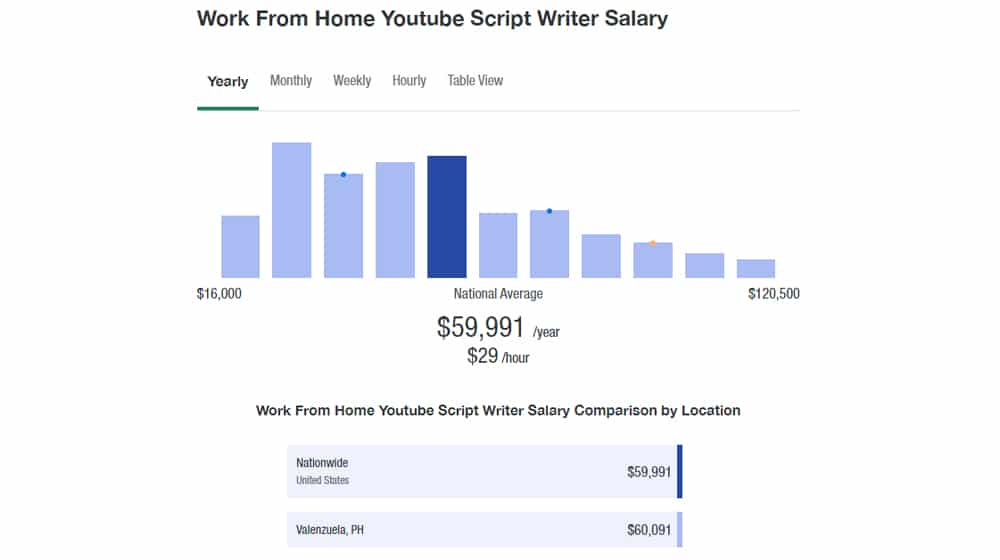
All of this data is about jobs in screenwriting and doesn't have anything to do with the value of spec scripts. If you're looking to take up screenwriting as a spec freelance job, you'll be looking at different figures entirely.
If you join the Writers Guild of America, you can leverage the basic contract they produce and revise every few years, called the Schedule of Minimums. This is a lengthy and official contract that has been negotiated between the Writers Guild and the heads of various studios throughout the country. They also have a Minimum Basic Agreement as well.
 Note that "theatrical" in the agreement doesn't refer to theater as we think of it; it applies to movies and productions with a theatrical release.
Note that "theatrical" in the agreement doesn't refer to theater as we think of it; it applies to movies and productions with a theatrical release.The schedule of minimums for a movie script ranges from $77k to $145k, but that's deceptive; it's also broken up into specific services. For example, if you sell the first draft of a script and the studio decides they don't need to do anything more to it and don't want you to make a second draft, you only get the guaranteed minimum of a first draft, which is $35k to $58k.
At the same time, there are a wide variety of additional sources of compensation, including residuals, spin-off media, and also writing services like polishing a screenplay and rewriting a screenplay from elsewhere.
One nice quirk of this contract is that the compensation for a screenplay isn't necessarily solely subject to negotiation between writer and studio. It's also governed by the overall budget of the production. This helps prevent hundred-million-dollar productions like the latest Marvel film from paying sub-standard rates for a screenplay (though, of course, companies like Disney aren't likely to be buying scripts on spec in the first place.)
Television scripts are, likewise, governed by this agreement. The compensation depends not just on the production but on the length of the final product. If you've ever wondered why many episodes of TV shows are under 30 minutes long (rather than, say, 31), this is part of the reason. The other part, of course, is to make room for commercial breaks.
All of this is complex and difficult to navigate. This article does a good job of some basic breakdowns and resources for further reading if you don't want to try to interpret the whole document yourself.
You might look at all of the above and wonder, is being a screenwriter worth it?
 The answer depends on you.
The answer depends on you.On the one hand, screenwriting is often a relatively thankless task and is even frequently uncredited. It can be difficult to work your way up to a point where you're making a good wage doing it. Moreover, if you're trying to stick to a freelance and spec script career, you're going to have a lot of times where sales are few and far between. It's simply part of the nature of spec writing in general.

On the other hand, it's one of the more fulfilling avenues for a creative career if you can swing it. You have a direct outlet for your creativity, and if you can maintain enough control over your script, it can be immensely satisfying to see your creative vision come to life on screen. Very few careers offer that kind of fulfillment.
Screenwriting as a more standard career – non-spec work – is also often quite fulfilling but often also full of uncertainty. You never know when a TV show will have a poor reception and end up canceled, a movie will be stuck in limbo for years, or any number of other problems can crop up. On the plus side, once you have your foot in the door, it's often relatively easy to ride that from job to job, building up connections and a reputation.
Screenwriting is, ultimately, a creative job. Whether or not it's worth pursuing depends on whether or not you can handle the trials of a creative job, the stresses of uncertainty, and the need to advocate for yourself in a way that allows you to keep going.
Have you worked as a screenwriter? Did we miss anything? If so, feel free to talk about your experiences in the comments. It's always good to get another perspective on a potential career, and we'd love to hear what you think!
We encourage you to share this article on Twitter and Facebook. Just click those two links - you'll see why.
It's important to share the news to spread the truth. Most people won't.